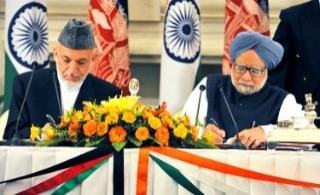Turkistan Islamic Party Increases Its Media Profile
By Jacob Zenn (the 05/02/2014 issue of the CACI Analyst)
One of the main objectives of terrorist and other non-state militant groups, especially those which are significantly weaker than the states they oppose, is to win the narrative. The Turkistan Islamic Party (TIP), an Uighur-led and Pakistan-based militant group, in its own words seeks to “liberate East Turkistan [Xinjiang] from its Communist oppressors.” Although the TIP has carried out few attacks in China, it is a frequent contributor of anti-Chinese and anti-American propaganda to al-Qaeda online forums. The TIP’s praise of several high-profile attacks by Uyghurs in China in 2013 has placed the TIP in greater spotlight than ever before in its role as a mouthpiece for the Uighur militant cause.

“CACI Analyst, January 22, 2014”
Afghanistan and India Deepen Strategic Cooperation
By Richard Weitz (the 22/01/2014 issue of the CACI Analyst)
India has made major economic, political, and strategic investments in Afghanistan since the Taliban lost power in 2001. The two countries share an interest in Afghanistan’s postwar reconstruction, pursuing common diplomatic goals, and cooperating against mutual security threats. For years, India has been undertaking programs to bolster Afghanistan’s security capabilities and integrate the country into regional diplomatic and economic structures. Now with the withdrawal of Western combat forces, India is acceding to longstanding Afghan government requests and deepening bilateral security cooperation, despite the risks of provoking a strong and adverse reaction in Islamabad, as well as enlarging their economic collaboration.

Pakistan's New Strategic Leadership and the Afghanistan Situation
By Naveed Ahmad (the 08/01/2014 issue of the CACI Analyst)
Pakistan’s third-time Prime Minister Nawaz Sharif has appointed a new Chief of Army Staff replacing former President Pervez Musharraf’s handpicked man, General Ashfaq Pervez Kiani. The elevation of General Raheel Sharif made global headlines primarily due to the country’s nuclear capability and its military’s tendency to intervene in politics through overt coup d’états. General Sharif, however, assumes leadership of the world’s sixth largest military at a time when NATO troops are in a process of withdrawing from Afghanistan after a presence lasting over a decade. Despite Pakistan’s improved democratic credentials, the leverage of its army chief on policies towards Afghanistan and India is likely to remain as decisive as it has ever been.



